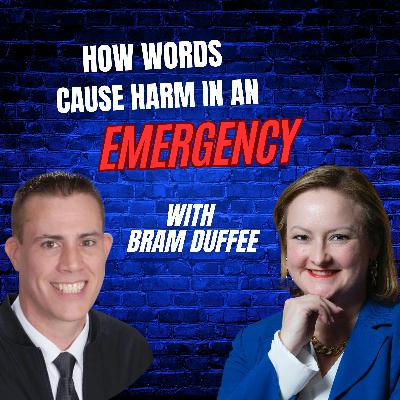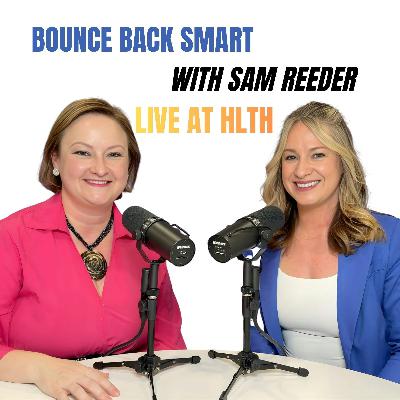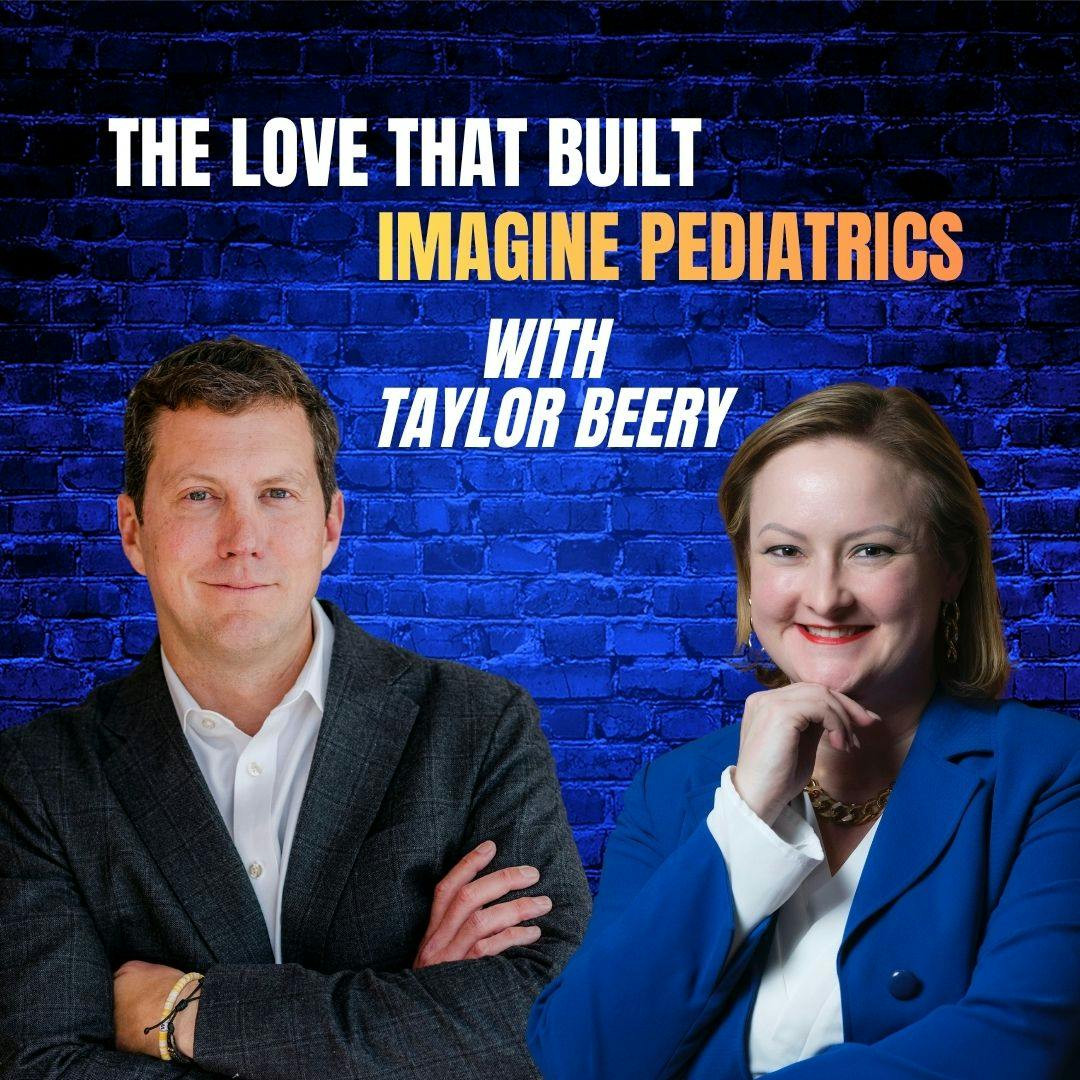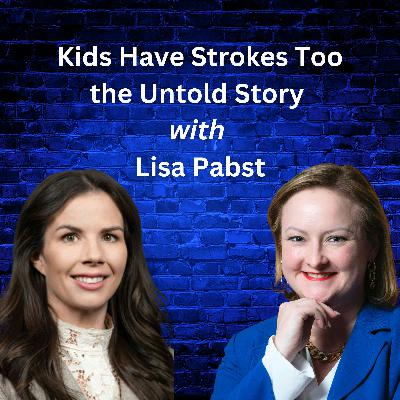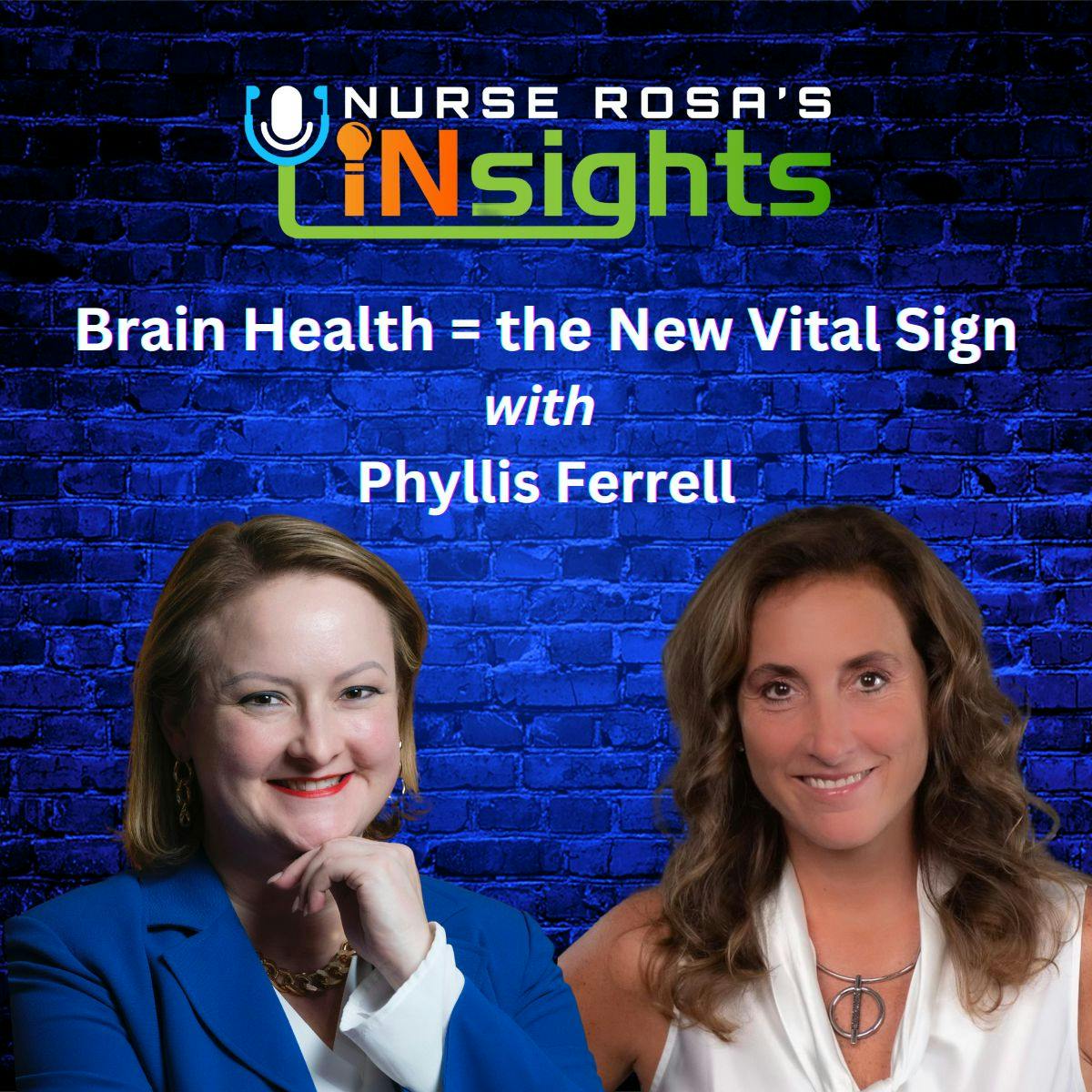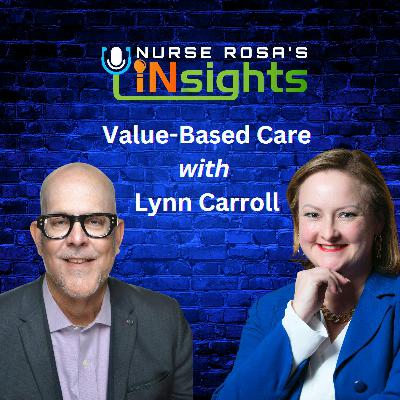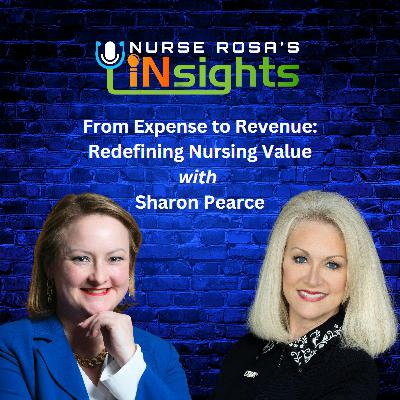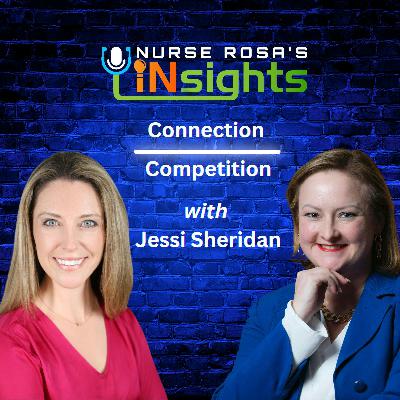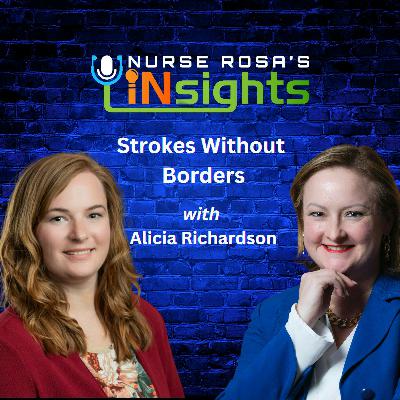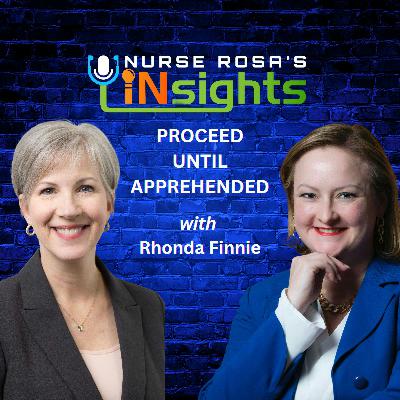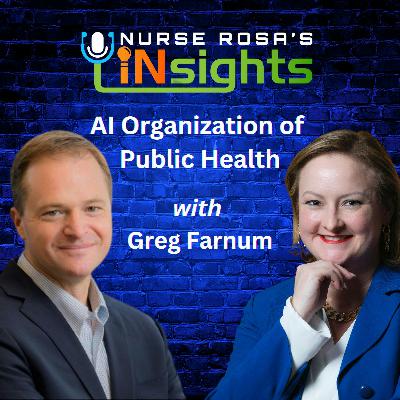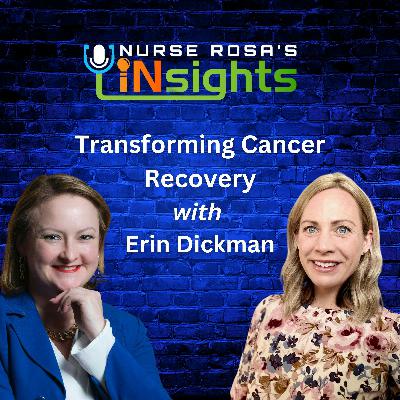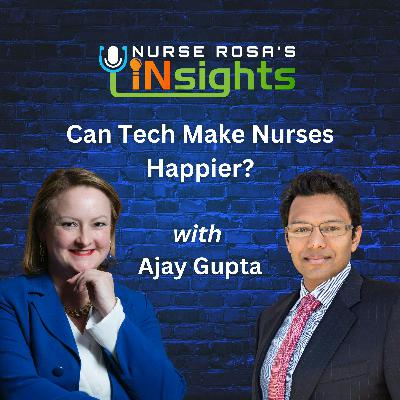Discover Nurse Rosa's INsights
Nurse Rosa's INsights

Nurse Rosa's INsights
Author: Rosa Hart
Subscribed: 1Played: 1Subscribe
Share
© 2024 Rosa Hart
Description
Rosa Hart interviews healthcare stakeholders to find out what needs they see in their specialty and learn about their proposed methods to meet them. Anyone can complain, but this podcast is for possibility thinkers who are ready to create solutions.
54 Episodes
Reverse
In this episode, Rosa Hart sits down with Justin Gill, DNP, APRN, RN, FNP-C, Urgent Care Nurse Practitioner and President of the Washington State Nurses Association (WSNA). Justin is a nationally known voice for modern nursing advocacy, health policy engagement, and combating misinformation in healthcare.
Together, they dive into:
How misinformation spreads and why nurses are uniquely positioned to counter it
The difference between political involvement and partisan loyalty—and why nurses must understand the distinction
Why nurses belong in elected and appointed positions where decisions are truly made
How to elevate nursing identity beyond a task-based role to a profession of influence, expertise, and leadership
Justin’s vision for investing in the profession:
50% toward political and public-policy training for nurses and healthcare workers
50% toward professional development programs in schools of nursing to build identity, voice, and confidence early
Whether you're a bedside nurse, advanced practice provider, nursing student, faculty member, or healthcare advocate, this episode empowers you to see how your voice can shape policy, public trust, and the future of healthcare.
Instagram: @gill.justin
Facebook: https://www.facebook.com/justingill90
BlueSky: @justin-gill.bsky.social
LinkedIn: https://www.linkedin.com/in/justingill
Follow Rosa on social media for more insights, advocacy conversations, and brain-health education:Instagram/TikTok/X: @NurseRosaSpeaksFollow "Nurse Rosa’s Insights" on your favorite podcast platform.
What if the words you say to a patient in crisis are as critical as the medications you give them? Dr. Bram Duffee, a 25-year paramedic working 72-hour weeks on Houston ambulances AND a PhD researcher, reveals why patients in medical emergencies enter a hypnotic state that makes them hyper-vulnerable to every word you say.
Bram started saving lives at 14 and became one of the youngest paramedics in the country at 19. Now he splits his time between critical care ambulance work, teaching 170 communication students at Kennesaw State University, and leading research at the First Responder Behavioral Health Institute. His latest book, Hypnotic Communication in Emergency Medical Settings, hit #1 in Amazon's Emergency Medicine category for a reason.
In this episode:
Why patients become highly suggestible during medical emergencies
The nocebo effect: how your words can accidentally worsen outcomes
Rapid rapport-building techniques for high-stress situations
The paramedic PTSD crisis nobody talks about (Bram shares his own story)
Why EMS research is critically underfunded—and what we can do about it
Therapeutic communication strategies that improve patient outcomes
This isn't soft skills—it's clinical intervention backed by 25 years in the field and peer-reviewed research.
🎧 Essential listening for: Paramedics, EMTs, ER nurses, critical care staff, and first responders
CONNECT WITH BRAM:
First Responder Behavioral Health Institute: frbhi.com
Faculty page: facultyweb.kennesaw.edu/bduffee
CONNECT WITH ROSA:
NurseRosaSpeaks.com
Women are experiencing twice the side effects—and no one ever told them why.
In this episode of Nurse Rosa’s INsights, I talk with Jessica Federer, one of the most important leaders in women’s health innovation and digital transformation. Jessica is the Managing Partner of The Women’s Health Fund, an investor, a board member for public and private companies around the world, and a globally recognized expert in health technologies. She previously served as the first woman Chief Digital Officer in global pharma at Bayer A.G., led digital health expansions during the pandemic, advised McKinsey, contributed to Fortune Global 100 strategy, and helped scale disruptive health startups. She has been named a Rock Health “Icon,” a Health Equity Champion, and one of the top 100 Chief Digital Officers.
Together, we break down one of medicine’s biggest blind spots: the long-standing belief that treating men and women the same was “equal.” In reality, that approach left women overlooked, misdiagnosed, and disproportionately harmed. From medication side effects to disease presentation to the silent X chromosome that’s almost entirely ignored in medical training. Jessica reveals why sex-based differences are not a niche topic but a foundational requirement for understanding every health condition.
This conversation calls for a new paradigm in research, clinical care, and medical education. Women’s health outcomes have been shaped by decades of male-default research. Changing that means embracing accurate, evidence-based, sex-informed medicine and finally giving women the healthcare they deserve.
Find Jessica Federer on LinkedIN
Connect with Nurse Rosa on social media @NurseRosaSpeaks
Email: info@nurserosaspeaks.com
If you enjoyed this episode, please like, subscribe, and share it.
Know someone with a great answer to the Billion Dollar Question?
Reach out and Rosa may feature them in a future episode!
In this episode of Nurse Rosa’s INsights, Rosa sits down with high school innovator Maxwell Tran, who is transforming his personal experience with stuttering into meaningful healthcare technology. Maxwell shares how competitive public speaking helped him gain confidence and ultimately inspired his creation of AI-powered augmented-reality glasses designed to support people who stutter.
He explains how the idea emerged during a medical innovation program, CHOC Mi4, at Childrens Hospital of Orange County (now Rady Children's). Max describes how the glasses work by predicting words and offering phonetic cues, and why he’s partnering with the National Stuttering Association to refine his design.
Rosa and Maxwell also explore the broader applications of his technology for stroke survivors with aphasia and individuals living with neurodegenerative diseases, showcasing the impact of youth-led innovation on the future of patient care.
Find Maxwell on LinkedIN:
https://www.linkedin.com/in/maxwell-tran-bls-cpr-and-emr-8793092b8/
Connect with Nurse Rosa on social media @NurseRosaSpeaks
Email: info@nurserosaspeaks.com
If you enjoyed this episode, please like, subscribe, and share it.
Know someone with a great answer to the Billion Dollar Question?
Reach out and Rosa may feature them in a future episode.
In this episode, I sit down with Irina Koyfman, DNP, NP-C, RN, CEO of Affinity Expert, clinician and author.
She is a purpose-driven nurse leader, and joins us to talk about leading with integrity in a high-stress healthcare system. With more than 25 years of clinical and executive experience, Irina shares why her motto “Purpose before Profit” guides every chapter of her work. She also opens up about her upcoming book on the Sandwich Generation and the emotional, spiritual, and practical tools needed to care for others while caring for yourself.
A conversation about resilience, prevention, and what it looks like to build a healthier future from the inside out.
Find Dr. Irina Koyfman on LinkedIn
and learn more about her work at:
www.affinityexpert.com
Connect with Nurse Rosa on social media @NurseRosaSpeaksEmail: info@nurserosaspeaks.com
If you enjoyed this episode, please like, subscribe, and share it.Know someone with a great answer to the Billion Dollar Question? Reach out and Rosa may feature them in a future episode.
Thank you for listening!
What if recovering from an injury felt empowering instead of overwhelming? This episode of Nurse Rosa’s Insights dives into the future of adaptive fitness with Dr. Samantha Reeder, an emergency medicine physician, Navy veteran, entrepreneur, and founder of Bounce Back Smart. Recorded live at the HLTH conference in Las Vegas, Sam shares how her experiences in the ER, the military, and her own injuries led her to build an AI-powered fitness app designed to help people regain strength and confidence safely.
In This Episode, We Cover:
Samantha’s path from emergency medicine and military service to entrepreneurship
How her personal injury experiences inspired Bounce Back Smart
What makes the app unique: adaptive workouts that adjust to individual needs, limitations, and preferences including pregnancy, postpartum, and chronic aches
How AI creates safer, personalized fitness recommendations
Samantha’s entry into tech and the tools that helped her build the app including vibe coding
Practical advice for clinicians and non-tech founders exploring app development or AI
How to find partners who understand HIPAA compliance and medically responsible design
Highlights from the HLTH conference including the energy of the nurse hackathon
The Billion Dollar Question. Samantha would invest in expanding access to individualized care so people receive the right help at the right time
The potential of telemedicine and digital tools to close healthcare gaps
Encouragement for innovators to use AI, start where they are, and connect within the healthcare tech ecosystem
Learn more at https://bouncebacksmart.com/
Connect with Dr. Samantha Reeder on LinkedIN: / samanthareeder1990
Connect with Nurse Rosa on social media:
@nurserosaspeaks
Email: info@nurserosaspeaks.com
If you enjoyed this episode, please like, subscribe, and share it.
Know someone with a great answer to the Billion Dollar Question? Reach out and Rosa may feature them in a future episode.
Thank you for listening!
Out of unimaginable loss came a mission to bring hope, healing, and joy to families who need it most.
In this episode of Nurse Rosa’s INsights, host Rosa Hart speaks with Taylor Beery, Chief Innovation & Administrative Officer and co-founder of Imagine Pediatrics, a mission-driven medical group transforming care for children with medical complexity and special healthcare needs.
Taylor shares his deeply personal journey that led to the founding of Imagine Pediatrics, including the story of his son, Walker, who lived with medulloblastoma, a pediatric brain cancer, for two years before passing away. Together with Walker, Taylor helped launch Kids Join the Fight in 2021—a nonprofit dedicated to curing pediatric brain cancer and supporting children and families battling the disease.
Today, Taylor channels that same passion into Imagine Pediatrics, ensuring that every child receives the timely, high-quality, and compassionate care they deserve. As Chief Innovation & Administrative Officer, he oversees the daily delivery of Imagine Pediatrics’ integrated model, which combines medical, behavioral, and social support to serve nearly 40,000 children across multiple states. The organization partners with health plans to provide these services at no cost to families, offering 24/7 virtual access to personalized care that helps kids spend more time at home and less time in the hospital.
Before founding Imagine Pediatrics, Taylor held executive roles across multiple industries and served as Policy Director for the White House office established to help rebuild the Gulf Coast following Hurricane Katrina. A graduate of the University of Virginia with a degree in Economics, he now lives in Nashville, Tennessee, with his wife and family.
In this inspiring conversation, Taylor and Rosa explore the mission and heart behind Imagine Pediatrics, the importance of elevating caregiver voices in healthcare, and how innovation can create joy and dignity for families facing life’s greatest challenges.
Imagine Pediatrics delivers integrated medical, behavioral, and social care to children with special healthcare needs.
Services are provided at no cost through partnerships with health plans, serving nearly 40,000 children across multiple states.
The organization operates a 24/7 virtual care model designed to keep kids home and out of hospitals.
Taylor Beery’s personal experience as a parent of a child with medical complexity inspired his lifelong commitment to improving pediatric care.
Kids Join the Fight, co-founded with his son Walker, continues to support families and advance pediatric brain cancer research.
Caregiver representation remains a critical need in healthcare discussions.
The legacy of Walker Beery lives on through Imagine Pediatrics’ mission to bring compassion, innovation, and hope to families nationwide.
Connect with Taylor Beery on LinkedIN
Follow Nurse Rosa’s INsights for more conversations that amplify hope and highlight innovation in healthcare.
Connect with Rosa @NurseRosaSpeaksVisit NurseRosaSpeaks.com for resources and upcoming episodes.
For more podcasts hosted by Rosa Hart, tune in to "Stronger After Stroke", "Aging Like A Pro" and "The Lou Review".
In this episode of Nurse Rosa’s INsights, host Rosa Hart speaks with Dr. Selin Kurnaz, CEO and co-founder of MassiveBio, and Craig Lipset, a globally recognized expert in decentralized clinical trials. Together, they discuss how artificial intelligence and technology are transforming patient access to clinical research and reshaping the future of healthcare innovation.
Their conversation explores how decentralized trials expand access for patients within their own communities as well as globally, the importance of patient engagement in successful research, and the critical role of trust and communication between patients and healthcare providers. They also address the barriers that keep patients unaware of available trials, the challenges of navigating the patient journey, and the need for new funding models to advance rare disease research.
Key takeaways include that AI and technology can dramatically reduce the time required to match patients with the right trials, while patient engagement and trust remain essential for participation. Decentralized trials open opportunities for more diverse populations, and simplifying the patient journey helps make research more accessible. Transparent data sharing empowers patients and improves outcomes, and innovative funding strategies are vital to support research for rare diseases. Ultimately, healthcare systems must evolve to better support participation in clinical trials, and collaboration among researchers, clinicians, and patients is the key to driving meaningful progress.
Connect with Craig Lipset on LinkedIN
Learn more about the Buffalo Initiative
Connect with Dr. Selin Kurnaz on LinkedIN
Visit MassiveBio.com
Follow Nurse Rosa’s INsights and leave a review for more conversations at the intersection of nursing, innovation, and patient empowerment.
Visit NurseRosaSpeaks.com for resources and upcoming episodes.
For more podcasts hosted by Rosa Hart, tune in to "Stronger After Stroke", "Aging Like A Pro" and "The Lou Review".
Most people don’t realize kids can have strokes too—and the warning signs often go unnoticed. In this episode of Nurse Rosa’s Insights, I sit down with Dr. Lisa Pabst, a pediatric stroke neurologist, to explore the hidden realities of pediatric stroke and the breakthroughs bringing hope to families.
Dr. Pabst shares her journey into pediatric neurology, the challenges of recognizing stroke symptoms in children, and how telestroke programs are transforming access to care in underserved areas. We dig into the unique causes of pediatric strokes—why they differ from adults, how seizures can mask the diagnosis, and the role lifestyle and even “stroke weather” can play.
She also shines a light on the collaborative spirit of the pediatric stroke community, the importance of raising awareness, and the critical need for long-term rehabilitation and follow-up for children recovering from stroke.
If you want to understand how innovation, teamwork, and education are reshaping pediatric stroke care, this is an episode you won’t want to miss.
Key Takeaways:
Pediatric stroke is rare but requires highly specialized care.
Telestroke programs are a game-changer for access, especially in rural or underserved areas.
Stroke causes in children differ from adults, demanding unique treatment approaches.
Awareness and education are vital for timely diagnosis and intervention.
Seizures are a common first symptom of stroke in children, often leading to misdiagnosis.
The pediatric stroke community is deeply collaborative and outcome-focused.
Lifestyle factors like diet and activity can influence pediatric stroke risk.
Resource-sharing and expert connections are key to better outcomes.
“Stroke weather,” linked to viral infections, can impact stroke incidence in kids.
Long-term follow-up and rehabilitation are essential for recovery.
Connect with Dr. Lisa Pabst by email at:
Lisa.pabst@hsc.utah.edu
Enjoyed this episode? Follow Nurse Rosa’s INsights, leave a ⭐⭐⭐⭐⭐ review, and share it with someone passionate about healthcare transformation and nursing leadership.
Follow Rosa on social media: @NurseRosaSpeaks
In this episode of Nurse Rosa’s INsights, host Rosa Hart sits down with Phyllis Farrell, a global leader in brain health and Alzheimer’s advocacy. With more than 25 years in healthcare—including two decades at Eli Lilly and Company, where she served as Global Head of External Engagement for Alzheimer’s and Neurodegeneration—Phyllis has shaped the development of late-stage Alzheimer’s treatments and now advises global initiatives through PBFerrell LLC, StartUp Health’s Alzheimer’s Moonshot, and the USC Schaeffer Institute, among others.
Rosa and Phyllis dive into the powerful connections between stroke prevention and Alzheimer’s care, why routine cognitive assessments should start at age 50, and how lifestyle changes can prevent up to 40% of dementia cases. Phyllis highlights the urgent need to expand clinical trial access, especially for women who are disproportionately impacted as both patients and caregivers. She also emphasizes the vital role of caregivers, the importance of public health campaigns to reduce stigma, and how advocacy and storytelling can empower individuals and communities.
Blending personal insight from her own family’s experience with professional expertise, Phyllis makes a compelling case for why brain health should be a public health priority—and what each of us can do to protect it.
Connect with Phyllis Ferrell on LinkedIn
Connect with Nurse Rosa Hart
For more podcasts hosted by Rosa Hart, see "Stronger After Stroke", "The Lou Review" and "Aging Like A Pro".
Nurse Rosa Hart sits down with Lynn Carroll, COO and Head of Strategy at HSBlox, to unpack the future of value-based care and its impact on patients, providers, and healthcare systems. From misconceptions about value-based payment models to the role of nurses in care coordination, this episode explores how innovation is reshaping healthcare delivery.
Lynn also shares his personal journey with a kidney transplant, giving a firsthand perspective on navigating the healthcare system. Together, we discuss why patient data sovereignty matters, how bundled payments can drive accountability, and where the next big opportunities lie in healthcare innovation.
If you want to understand the shift from fee-for-service to value-based care and how it affects patients, nurses, and providers, this conversation is for you.
✨ Key Takeaways
Misconceptions about value-based care contracts and payment models.
Lynn’s personal story: living with end-stage renal disease and receiving a kidney transplant.
How nurses and care coordinators lead the success of value-based healthcare.
The future of patient data sovereignty and data ownership.
New tools: prospective bundled payment administration platform by HS Blox.
Lynn Carroll has served as COO and Head of Strategy at HSBlox for nearly eight years. A high-energy business professional, Lynn launched a successful healthcare payments platform business during the infancy of HIPAA compliance and helped lead its growth through the ACA and beyond.
An expert in value-based contracts, bundled payments, P4P and global reimbursement, alternative payment models, episodes of care, and contract administration, Lynn has deep expertise in the healthcare insurance and integrated payments ecosystems.
Among his successful launches are enterprise solutions for premium invoicing and collection, digital payments, patient financial engagement, prospective bundled payments, and value-based contract administration. His work is dedicated to expanding the collaborative footprint of payers and providers within value-based programs and transparency frameworks.
At HSBlox, Lynn is advancing patient data sovereignty and trusted data exchange frameworks to ensure permissioned, accurate, real-time data flow — delivering on the promise of improved patient and provider experience, better outcomes, and reduced cost trends.
Connect with Lynn on LinkedIn or visit the HSBlox website.
Enjoyed this episode? Follow Nurse Rosa’s INsights, leave a ⭐⭐⭐⭐⭐ review, and share it with someone passionate about healthcare transformation and nursing leadership.
Follow Rosa on social media: @NurseRosaSpeaks
Don’t forget to like, comment, and subscribe for more expert insights on healthcare innovation, patient care, and value-based medicine.
More Podcasts by Rosa Hart
Stronger After Stroke
Aging Like A Pro
The Lou Review
#ValueBasedCare #HealthcareInnovation #NursingLeadership #PatientData #NurseRosaInsights
What if nurses weren’t seen as a hospital expense—but as a revenue generator? In this episode of
Nurse Rosa’s INsights, meet Sharon Pearce, DNP, CRNA, FAANA, FAAN, a nationally recognized nurse leader, advocate, and co-host of the award-winning "Beyond the Mask" podcast.
With over 40 years in nursing and decades of advocacy at both state and national levels, Sharon brings her deep expertise in policy, leadership, and health care systems to a critical conversation about reimagining the role of nurses in hospital economics.
We explore how transitioning nurses from the “cost side” to the “revenue side” can fundamentally shift how nursing is valued, opening doors for sustainable healthcare models and greater recognition of nursing’s impact. Sharon shares her inspiring journey—from bedside nurse to CRNA, past AANA president, lobbyist, Yale DNP graduate, podcast host, and global speaker. You’ll also hear her personal story of advocacy for diabetes care and her leadership in groundbreaking legislation protecting children with diabetes at school.
What You’ll Learn in This Episode:
How nurses can move from being seen as expenses to recognized revenue drivers in healthcare
Sharon’s insights from her leadership roles in the AANA, NOA, and national advocacy work
The creation of Yale’s first-ever Candidate School for Nurses and why it matters for future nurse leaders
Lessons from Sharon’s run for the North Carolina State House of Representatives and the power of political engagement for nurses
The connection between Sharon’s personal journey with diabetes advocacy and legislative wins like SB 911
How nurse-led innovation and advocacy can transform healthcare’s future
About Today’s Guest:
Sharon Pearce, DNP, CRNA, FAANA, FAAN, has been a nurse for over 41 years, with a career spanning bedside care, anesthesia practice, legislative advocacy, and national leadership. She is the past president of the American Association of Nurse Anesthetists (AANA), co-chair of the Commission for Nurse Reimbursement, and co-host of Beyond the Mask, one of the top 50 medical podcasts in the country. Inducted into the FAAN in 2022, Sharon is a sought-after speaker on advocacy, healthcare policy, and nursing leadership.
Resources & Links:
Connect with Sharon Pearce
Listen to Beyond the Mask
Learn more about the Commission for Nurse Reimbursement
Connect with host Rosa Hart: @NurseRosaSpeaks
For more podcasts hosted by Rosa Hart, see Stronger After Stroke, Aging Like a Pro and The Lou Review.
What if the technology behind electronic health records could save lives, reduce health disparities, and reshape the future of caregiving?
In this episode of Nurse Rosa’s INsights, host Rosa Hart sits down with Leigh C. Burchell, Vice President of Policy and Government Affairs at Altera Digital Health and Chair of the Electronic Health Records Association.
Leigh shares how her upbringing and career shaped her passion for healthcare advocacy and policy. She reflects on the intersection of technology and patient care, describing how data-driven innovations in electronic health records (EHRs) can be life-altering for patients and providers alike:
“I know from so many different experiences that the technology we develop directly affects the lives of patients. The availability of data today changes diagnostic and treatment decisions and the patients' ability to actively partner in their own care — it isn’t hyperbolic to say that it’s changing lives.” – Leigh C. Burchell
The discussion explores how regulations can both guide and hinder innovation in health tech, why bridging policy and technology is vital, and how health equity must begin with access to basic resources like nutrition. Leigh also opens up about her personal connection to dementia and shares her vision for better infrastructure, research, and caregiver support in the years ahead:
“There are a lot of places $1 billion could be effectively spent to improve U.S. healthcare, unfortunately, but I’d probably focus on two areas: food insecurity and dementia research.” – Leigh C. Burchell
This thoughtful, forward-looking conversation highlights why what we do in healthcare truly matters and how innovative solutions can transform outcomes for patients and caregivers alike.
Learn more about Leigh's work:
alterahealth.com
Connect with Leigh on LinkedIN
Connect with Rosa Hart @NurseRosaSpeaks
For more podcasts hosted by Rosa Hart, see Stronger After Stroke, Aging Like a Pro and The Lou Review.
Join Rosa Hart and Dr. Anthony Chang as they explore the transformative role of artificial intelligence (AI) in healthcare. Together, they unpack how AI is reshaping medicine—reducing clinician burnout, improving patient outcomes, and rehumanizing care by giving providers more time at the bedside.
✨ What You’ll Learn in This Episode:
What AI really means in the healthcare context
Why now is the best time to engage with AI in medicine
How AI can reduce the administrative burden on clinicians—especially nurses
Why AI is not replacing clinicians but enhancing their work
Misconceptions about AI and how perspectives are shifting
The role of AI in creating more personalized and precise patient care
Why clinician involvement, education, and lifelong learning are vital in shaping AI’s future
💡 AI in healthcare isn’t about replacing the human touch—it’s about strengthening it.
Join us LIVE at AIMed25
Learn more about certification with ABAIM
Connect with Nurse Rosa Hart @NurseRosaSpeaks
Connect with Dr. Anthony Chang on LinkedIN
Anthony Chang, MD, MBA, MPH, MS is a pediatric cardiologist and Medical Director of the Heart Failure Program at Children’s Hospital of Orange County (CHOC), a part of Rady Children’s Health. Dr. Chang serves as Chief Intelligence and Innovation Officer of CHOC Sharon Disney Lund Medical Intelligence, Information, Investigation and Innovation Institute (Mi4). The Institute is the hub of medical intelligence and innovation at CHOC and serves as a national and international leader. Mi4 was the first institute of its kind in a children’s hospital. Dr. Chang completed his Master of Science (MS) in Data Science with a sub-specialization in artificial intelligence from Stanford School of Medicine and has completed a certification on artificial intelligence from MIT. Dr. Chang has a master’s in business administration (MBA) in Health Care Administration from the University of Miami School of Business and a master’s in public health (MPH) in Health Care Policy from the Jonathan Fielding School of Public Health of the University of California, Los Angeles.
Dr. Chang is the founder of the Pediatric Cardiac Intensive Care Society (PCICS) and the founder of the Asia-Pacific Pediatric Cardiac Society (APPCS). He started a pediatric innovation leadership group whose bi-annual symposium Pediatrics2040: Emerging Trends and Future Innovations has become a catalyst for the International Society for Pediatric Innovation (iSPI). Each summer, the Mi4 Summer Internship Program, founded by Dr. Chang, mentors close to 75 young future clinicians. Dr. Chang’s book, Intelligence-Based Medicine is the first of its kind textbook on AI in medicine and is used at colleges and universities around the globe. He is the founder and organizing chair of several Artificial Intelligence in Medicine (AI Med) that hosts meetings in the U.S. and abroad (Europe and Asia) focusing on artificial intelligence in healthcare and medicine (www.ai-med.io). He is also the founder the Medical Intelligence Society (MIS), the American Board of Artificial Intelligence in Medicine (ABAIM), and the Alliance of Centers in Artificial Intelligence in Medicine (ACAIM) and the Pediatric Centers of Artificial Intelligence in Medicine (PCAIM), now with nearly 100 participating centers from around the globe.
👉 Don’t forget to like, comment, and subscribe for more inspiring conversations on the future of healthcare!
For more podcasts hosted by Rosa Hart, tune in to Stronger After Stroke, Aging Like A Pro and The Lou Review.
What if the key to stronger leadership isn’t hustle—but connection?
In this episode of Nurse Rosa’s INsights, host Rosa Hart sits down with leadership coach Jessi Sheridan to explore how women can rise together through community, connection, and coaching. Jessi shares how her initiative, Habituelle, began as a storytelling platform and evolved into a thriving empowerment community for women leaders.
Together, they unpack the growing problem of isolation, the dual nature of technology, and the urgent need for better health care access and support systems for women.
✨ What You’ll Learn:
Why leadership coaching is a powerful tool for women
How storytelling builds community and drives change
The lasting impact of the pandemic on women’s sense of connection
How Habituelle is reshaping leadership and wellness for women
Why investing in women’s health care is not optional—it’s essential
🎧 Tune in to hear how Jessi is helping women lead with purpose, and why community is at the heart of healing.
Learn more about Habituelle Leadership coaching with Jessi Sheridan:
https://habituelleleadership.com/
Connect with Rosa Hart @NurseRosaSpeaks
🔔 Don’t forget to like, subscribe, and hit the bell for more expert interviews on the future of healthcare and innovation.
For more podcasts hosted by Rosa Hart, check out Stronger After Stroke, Aging Like a Pro and The Lou Review.
From hospital hallways to global health stages, Alicia Richardson is reimagining stroke care—one system at a time.
In this episode, Nurse Rosa speaks with Alicia Richardson about her experiences with the World Stroke Organization and her passion for nurse leadership.
Alicia shares her nursing journey, the global challenges faced in stroke prevention and treatment, and how cultural context plays a critical role in understanding risk factors. As a board-certified stroke coordinator and educator, she also emphasizes the power of interdisciplinary collaboration, technology-driven education, and the urgent need for primary prevention—especially since 80% of strokes are preventable.
🧩 Topics covered:
Global disparities in stroke care and access
Alicia’s experience in the WSO Future Leaders Program
Using technology and education to scale stroke knowledge
Risk factor awareness across cultures
The value of collaboration among nursing and neurovascular organizations
Evolving roles of advanced practice nurses and stroke coordinators
🎓 From being named Advanced Practice Clinician of the Year to leading the Association of Neurovascular Clinicians (ANVC) as its current President, Alicia’s leadership journey exemplifies the future of stroke systems—driven by data, compassion, and nurse-led innovation.
💡 "If we want to reduce disability, we must start by investing in prevention. Most strokes are preventable, and nurses are essential to that mission."
🔗 Connect & Learn More:
🌐 www.anvc.org
World Stroke Organization
SVIN
🔗 Alicia Richardson on LinkedIn
Connect with Rosa Hart @NurseRosaSpeaks
🔔 Don’t forget to like, subscribe, and hit the bell for more expert interviews on the future of healthcare and innovation.
For more podcasts hosted by Rosa Hart, check out Stronger After Stroke, Aging Like a Pro and The Lou Review.
Some nurses follow a path—others pave it .
In this powerful episode of Nurse Rosa’s INsights, host Rosa Hart talks with Dr. Rhonda Finnie, DNP, MBA, AGACNP-BC, ANVP-BC, ASC-BC—president-elect of the Association of Neurovascular Clinicians (ANVC)—about how personal tragedy reshaped her purpose and led her to a remarkable career in neurosurgery, stroke care, and nursing leadership.
Dr. Finney shares how the loss of her young son Derek to a brain tumor became the turning point that called her into nursing. From her beginnings in neurosurgery to her leadership in hospice, stroke, and advanced practice, she speaks candidly about ownership, mentorship, certification, and how to create sustainable systems that strengthen stroke care and improve access worldwide.
About Dr. Rhonda Finnie
Nurse Practitioner at Baptist Health – Little Rock
President-Elect (2023–2025), Association of Neurovascular Clinicians
Chair, Board of Directors, Arkansas Hospice
APP Leadership Team, Neurocritical Care Society
Chair, Door-In Door-Out Subcommittee, Arkansas Acute Stroke Task Force
Contributor, AHA Stroke/Neurovascular Council’s Neurocritical Care Committee
Honors include:
2018 Harding University Carr College of Nursing Alum of the Year
2022 AANP State Award for Excellence
2024 UTHSC College of Nursing Alumni of the Year
🖥️ Connect with Dr. Finnie
🔗 ANVC – Association of Neurovascular Clinicians
🔗 LinkedIn
Connect with Rosa Hart: @NurseRosaSpeaks
🔔 Don’t forget to like, subscribe, and hit the bell for more expert interviews on the future of healthcare and innovation.
For more podcasts hosted by Nurse Rosa, check out Stronger After Stroke, Aging Like a Pro and The Lou Review.
Nurse Rosa Hart interviews Greg Farnum, Senior Vice President and General Manager at Audacious Inquiry, a PointClickCare company. With over 30 years in health IT innovation, Greg shares his expert vision for organizing public health with AI to reduce costs, improve care, and transform how government healthcare systems operate.
You’ll hear how artificial intelligence in healthcare is already being used to tackle the administrative burden in healthcare, reduce medication errors, and support public health infrastructure through smarter, data-driven solutions. Greg also explains how interoperability, especially through FHIR data standards, is key to improving outcomes across the system—from local health departments to national healthcare agencies.
Whether you're curious about AI in public health, healthcare policy and innovation, or how to modernize public health technology, this conversation is packed with insight and strategy from one of the most respected leaders in the field.
Key topics include:
✅ Automating administrative tasks in hospitals
✅ Scaling AI healthcare efficiency
✅ Health data modernization at the federal level
✅ Using tech to keep patients healthier and out of the hospital
✅ Real-world success stories from Greg’s work with HHS and hospital associations
📲 Connect with Greg Farnum on LinkedIn
Learn more about Audacious Inquiry at ainq.com
Connect with Nurse Rosa: @NurseRosaSpeaks on social media
🔔 Don’t forget to like, subscribe, and hit the bell for more expert interviews on the future of healthcare and innovation.
For more podcasts hosted by Nurse Rosa, check out Stronger After Stroke, Aging Like a Pro and The Lou Review.
🎗 Think cancer care ends with treatment? Think again. Click to hear how nurses like Dr. Erin Dickman are changing the game for survivors.
Erin Dickman, DNP, RN, OCN is Clinical Program Specialist for ImpediMed, and an experienced oncology nurse leader with over 15 years in clinical care, education, and program development. She earned her doctorate from The Ohio State University and is a trained human-centered design practitioner. An expert in evidence-based lymphedema surveillance programs, Dr. Dickman brings an evidence-based, practical approach to improving cancer survivorship and nursing practice. Her innovative work has been highlighted by the American Nurses Association Innovation Lounge. A national speaker and published author, she’s passionate about translating research into practice and advancing cancer care delivery.With a career marked by visionary thinking, interdisciplinary collaboration, and a passion for advancing oncology nursing practice, she continues to influence the field through education, advocacy, and strategic innovation." She is working to close the persistent gaps in cancer survivorship care, particularly during the vulnerable transition from active treatment to long-term follow-up. Oncology nurses are needed to lead the development and implementation of dynamic, individualized survivorship care plans that address both the physical and emotional effects of cancer treatment. A critical focus of her work is on proactive, evidence-based lymphedema surveillance using advanced tools like bioimpedance spectroscopy (BIS), aiming to prevent complications and reduce the long-term financial and quality-of-life burdens patients face. By empowering nurses with the skills and resources to provide comprehensive survivorship support, she advocates for a model of care that is continuous, patient-centered, and rooted in early intervention."If awarded a $1 billion grant, I would revolutionize cancer survivorship care by addressing a critical gap: the lack of consistent, proactive monitoring for long-term side effects like lymphedema. Too often, survivors are without structured follow-up, leaving symptoms unrecognized until they significantly impact quality of life. To close this care gap, I would create a nationwide, nursing-led program focused on early symptom surveillance using advanced technology. Rooted in evidence-based practice and holistic, person-centered care, this initiative would integrate precision medicine and interprofessional collaboration to ensure every survivor receives continuous, meaningful support. My goal is to empower survivors to live well beyond their diagnosis and set a new standard for equitable, long-term oncology care.”This conversation is a must-listen for nurses, healthcare providers, and anyone passionate about improving long-term outcomes for cancer survivors.💡 Key Takeaways:💧 Lymphedema affects 1 in 6 cancer survivors and is often reversible when caught early.🧠 Education and consistent follow-up are key to empowering patients post-treatment.🩺 Nurses are vital in building trust, supporting recovery, and implementing care plans.🔍 Surveillance models allow for earlier interventions and improved patient outcomes.🔁 Survivorship care must be dynamic, personalized, and evidence-based.💡 Innovative tech tools can move lymphedema care from reactive to preventative.Connect with Dr. Erin Dickman on LinkedIn:
https://www.linkedin.com/in/erin-dickman/Learn more about the work she is doing as the Clinical Program Specialist at Impedimed:
www.impedimed.com
Connect with Nurse Rosa: https://linktr.ee/nurserosaspeaks
In this inspiring episode of Nurse Rosa’s INsights, healthcare innovator and disruptor Ajay Gupta shares how we can solve some
of healthcare’s toughest challenges—by using the right data in the right
ways. From COVID-19 response to predicting maternal mortality and opioid
hotspots, Ajay and his team at HSR.health are changing how we understand risk and resource allocation.
We explore how this data revolution can drive equity, quality, and
cost-effectiveness—and why Ajay believes investing in nurse wellness is the
smartest ROI in healthcare.
Plus, hear Ajay’s “$1 Billion Idea” that could change the future of
nursing and care delivery.
Learn more about HSR.health
Connect with Ajay Gupta on LinkedIN
Connect with Nurse Rosa Hart @NurseRosaSpeaks


